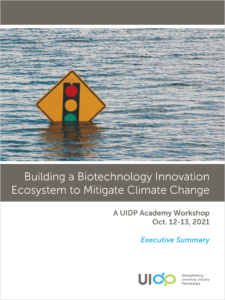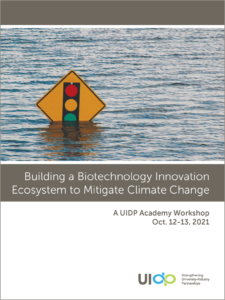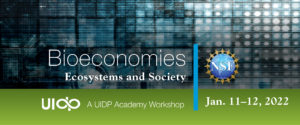Innovation in the Bioeconomy | Building a Biotechnology Innovation Ecosystem to Mitigate Climate Change
Workshops to catalyze translation and partnerships
 Sponsored by the National Science Foundation, award #2137471
Sponsored by the National Science Foundation, award #2137471
Held Oct. 12-13, 2021
Anthropogenic greenhouse gas emissions continue to rise globally, driving urgency to mitigate climate impacts on our ecosystems, economy, public health, and future wellbeing. While current policies strive to curb some emissions, broad implementation and adoption of further technological advancements is required to achieve emission targets to limit warming to 1.5°C to 2°C. Federal agencies such as the National Science Foundation (NSF) are coordinating efforts to develop partnerships to mitigate climate change.
This workshop convened stakeholders from multiple sectors and disciplines identify the primary levers by which climate change can be slowed or reversed using biotechnological or synthetic biology innovations that enhance the adaptation, resilience, preservation, and restoration of natural and managed ecosystems in response to climate change.
More than 100 participants from the academic, corporate, government, and nonprofit sectors convened virtually for two days to discuss potential research and technology needs for biotechnology innovation ecosystems to mitigate climate change. The invited scientists and researchers were strategically selected to ensure that diverse perspectives and expertise were represented in the workshop deliberations. Participants explored themes related to systems analysis, managed systems, natural systems, and bioengineering/synthetic biology to identify the best opportunities. Topics discussed include regional considerations and risks, identified challenges to scaling up nascent solutions, implementation and adaptive management approaches, and supply chain and market considerations for new technology.
See the executive summary for workshop findings in brief as well as critical topics and advancements needed to achieve large-scale climate change mitigation via biotechnology. The report also includes narrative descriptions of sessions, key takeaways from topical breakouts, and an overview of the research landscape by Elsevier.
UIDP would like to thank the National Science Foundation (NSF) and specifically the Division of Molecular and Cellular Biosciences (MCB) for its financial investment in this workshop. An NSF working group consisting of Stephen DiFazio, Anthony Garza, Maureen Kearney, Bruce Hamilton, and Adrienne Cheng provided their technical guidance. Theresa Good served as our point of contact with the National Science Foundation and offered us tremendous guidance over the course of planning and implementing the event.
Download the materials for Building a Biotechnology Innovation Ecosystem to Mitigate Climate Change below.
Download the Executive Summary
Download the full report
Additional Reading
A Landscape Analysis of Biotechnology Research to Mitigate Climate Change, Elsevier Analytical Services
This work was commissioned to provide insight into biotechnology research that can and has been harnessed to mitigate climate change (Biotechnology for CC). The analyses provides insight into how much research has been done, who the global leaders in the research areas are, what sectors are leading the research, and how the research is being used to support other research and innovations.
See other reports in this series
Feeding the Planet Sustainably





